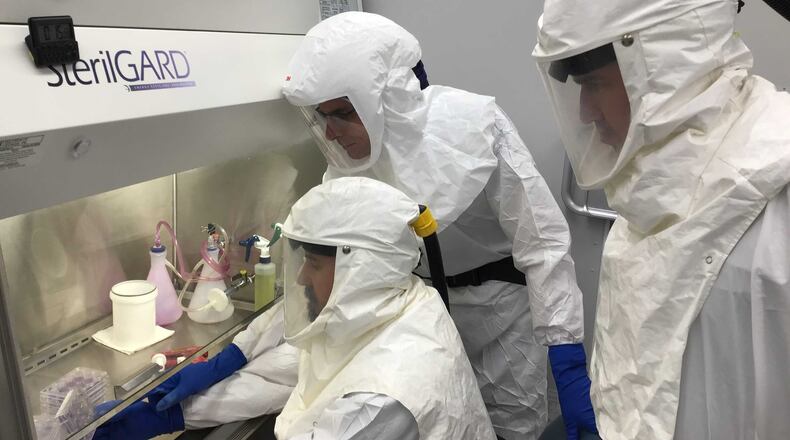Georgia State University researchers believe they’ve taken a step forward in helping to develop an oral drug to treat COVID-19.
A new front has opened in the battle to develop medications to fight COVID-19. Now that effective vaccines are available to prevent the disease, researchers are focusing on drugs to treat COVID-19 after someone is infected and before they need hospitalization. The company Merck has recently taken the lead, producing an antiviral oral medication that it hopes will get federal approval here.
A peer-reviewed study of GSU’s research, released last week in the top-line publication Nature Communications, found an oral version of the drug remdesivir was effective against the SARS-CoV-2, the virus that causes COVID-19, in ferrets. Ferrets have been frequently used in COVID-19 research. Remdesivir, made by the drug company Gilead Sciences, is currently used to treat COVID-19, but it must be used intravenously.
Gilead said there are no immediate plans to begin testing the drug that GSU worked on in human volunteers. Gilead told The Atlanta Journal-Constitution that the GSU studies offer a tool to study oral antivirals for COVID-19. The company is interested in other drugs that might work as oral medications, though. The drugmaker said in a statement, “At Gilead we are exploring options, including novel oral antivirals, to address this unmet need.”
Georgia State’s team said their work “could be groundbreaking in improving patient access to treatment early after infection.” Remdesivir is currently the only antiviral drug approved to treat COVID-19.
For Dr. Tom Fausett, a family physician in Adel and president of the Georgia Academy of Family Physicians, an antiviral pill that he can prescribe to his patients at home, before they get hospitalized, would be a game-changer.
While it’s not illegal to give intravenous remdesivir outside the hospital, the Food and Drug Administration says it should be used only in hospitals or settings with hospital-level care available, and that’s what Fausett does. That makes it tough to use remdesivir on his patients when it’s supposed to be most helpful: early in the infection.
“Somebody who is hospitalized with COVID is already further into the disease,” Fausett said. “By the time they actually get the IV remdesivir, they’re really already really sick.”
The remdesivir study is just one more example of Georgia’s medical schools and research centers taking a significant role in fighting the pandemic.
Several leading pharmaceutical companies, such as Pfizer, are also working to develop oral medications to treat COVID-19, and have produced research showing their drugs are highly effective. Georgia State has been involved in some that research. Experts, caution that the medications must be given early in the disease.
Pfizer released research last week that showed its oral antiviral medication, Paxlovid, showed an 89% reduction in risk of COVID-19-related hospitalization or death from any cause compared to placebo in patients treated within three days of symptom onset.
Merck and Ridgeback Biotherapeutics announced in October they plan to seek emergency use authorization from federal health officials for their oral antiviral COVID-19 treatment drug, molnupiravir, after research showed “compelling” results in clinical trials. Federal regulators are not expected to issue a decision until December. Emory University researchers helped develop molnupirvir and Georgia State was also involved in that research.
Grady Memorial Hospital, staffed by Morehouse and Emory researchers and medical doctors, was one of the trial sites for the Moderna vaccine.
Keep Reading
The Latest
Featured




